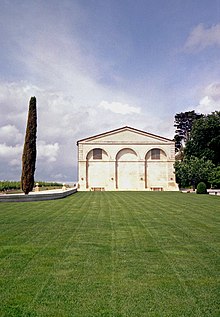Château Mouton Rothschild
Château Mouton Rothschild is a wine estate located in the village of Pauillac in the Médoc, 50 km (30 mi) north-west of the city of Bordeaux, France. Its red wine of the same name is regarded as one of the world’s greatest clarets. Originally known as Château Brane-Mouton it was renamed by Nathaniel de Rothschild in 1853 to Château Mouton Rothschild. It was the first estate to begin complete château bottling of the harvest.[1]
The branch of the Rothschild family owning Mouton Rothschild are members of the Primum Familiae Vini.
History
The Bordeaux Wine Official Classification of 1855 was based entirely on recent market prices for a vineyard’s wines, with one exception: Château Mouton Rothschild. Despite the market prices for their vineyard’s wines equalling that of Château Lafite Rothschild, Château Mouton Rothschild was excluded from First Great Growth status, an act that Baron Philippe de Rothschild referred to as “the monstrous injustice”. It is widely believed that the exception was made because the vineyard had recently been purchased by an Englishman and was no longer in French ownership.
In 1973, Mouton was elevated to “first growth” status after decades of intense lobbying by its powerful and influential owner,[1] the only change in the original 1855 classification (excepting the 1856 addition of Château Cantemerle). This prompted a change of motto: previously, the motto of the wine was Premier ne puis, second ne daigne, Mouton suis. (“First, I cannot be. Second, I do not deign to be. Mouton I am.”), and it was changed to Premier je suis, Second je fus, Mouton ne change. (“First, I am. Second, I used to be. Mouton does not change.”)
Vineyards
Château Mouton Rothschild has its vineyards on the slopes leading down to the Gironde Estuary, in the Bordeaux region, mainly producing grapes of the Cabernet Sauvignon variety. Today, Château Mouton Rothschild has 203 acres (0.8 km²) of grape vines made up of Cabernet Sauvignon (77%), Merlot (11%), Cabernet Franc (10%) and Petit Verdot (2%). Their wine is fermented in oak vats (they are one of the last châteaux in the Médoc to use them) and then matured in new oak casks. It is also frequently confused with the widely distributed generic Bordeaux Mouton Cadet.
Labels
see also List of Artists who have created a Château Mouton Rothschild label and Labels 1945-present
Baron Philippe de Rothschild came up with the idea of having each year’s label designed by a famous artist of the day.[1] In 1946, this became a permanent and significant aspect of the Mouton image with labels created by some of the world’s great painters and sculptors. The only exception to date is the unusual gold-enamel bottle for 2000.
To celebrate the hundredth birthday of the acquisition of Château Mouton, the portrait of Baron Nathaniel de Rothschild appeared on the 1953 label. In 1977, Queen Elizabeth II and the Queen Mother visited the château and a special label was designed to commemorate the visit.
Twice in the history of their special labels, there have been two used for the same year. The first occurred in 1978 when Montreal artist Jean-Paul Riopelle submitted two designs. Baron Philippe de Rothschild liked them equally so he split the production run and used both designs. The 1993 Mouton label, a pencil drawing of a nude reclining nymphet by the French painter Balthus was rejected for use in the United States by the Bureau of Alcohol, Tobacco and Firearms.[2] As such, for the U.S. market the label was made with a blank space where the image should have been and both versions are sought after by collectors. The popularity of the label images results in auction prices for older and more collectible years being far out of sync with the other first growths, whose labels do not change year to year.
The most recent label, for Mouton’s 2009 vintage, is the work of Indian-born British artist Anish Kapoor.[3]
-
1975
-

1983
-
1990
-

1991
-
1992
-

1993
-

1994
-

1995
-
1996
-

1998
-

2000
Business dealings
In 1980, the vineyard officially announced their joint venture with Robert Mondavi to create Opus One Winery in Oakville, California. The 1990s saw large-scale expansion in the Americas under the leadership of President Cor Dubois, with the region eventually contributing almost half of the company’s turnover. In 1997, Château Mouton Rothschild teamed up with Concha y Toro of Chile to produce a quality Cabernet Sauvignon-based red wine in a new winery built in Chile’s Maipo Valley: The Almaviva.
The operation is today run by Baroness Philippine de Rothschild. In June 2003, the vineyard hosted La Fête de la Fleur at the end of Vinexpo to coincide with their 150th anniversary.
Judgment of Paris
The 1970 vintage took second place, and was the highest ranked French wine, at the historic 1976 Judgment of Paris wine competition.

